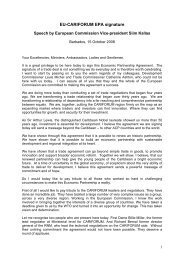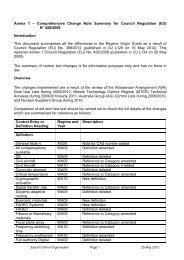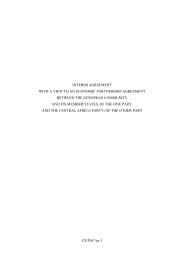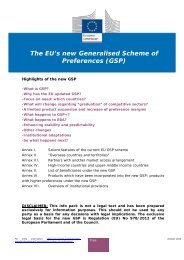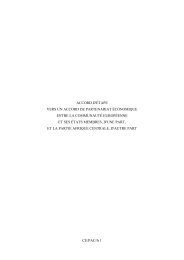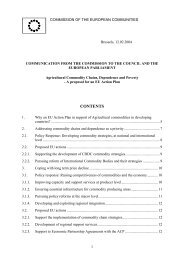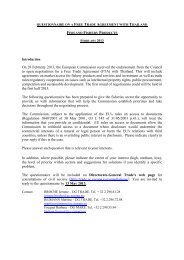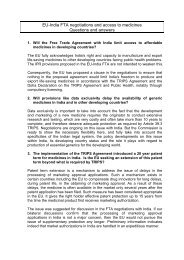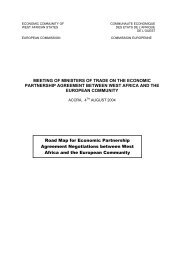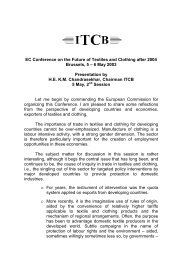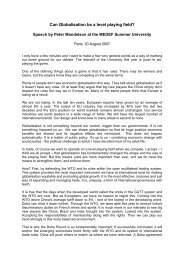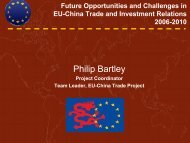Report on the Implementation of the derogation to ... - Trade Websites
Report on the Implementation of the derogation to ... - Trade Websites
Report on the Implementation of the derogation to ... - Trade Websites
You also want an ePaper? Increase the reach of your titles
YUMPU automatically turns print PDFs into web optimized ePapers that Google loves.
Final <str<strong>on</strong>g>Report</str<strong>on</strong>g><br />
RoO Derogati<strong>on</strong> under <strong>the</strong> PACP-IEPA<br />
The Parties recognise that since <strong>the</strong> Lomé C<strong>on</strong>venti<strong>on</strong> was signed in 1976, Pacific States<br />
have not been able <strong>to</strong> develop an adequate nati<strong>on</strong>al fleet respecting <strong>the</strong> vessel<br />
c<strong>on</strong>diti<strong>on</strong>s <strong>of</strong> Article 5.2 <strong>of</strong> <strong>the</strong> present Pro<strong>to</strong>col II [i.e. <strong>on</strong> ‘wholly obtained’ fish]. The<br />
Parties also recognise <strong>the</strong> special circumstances <strong>of</strong> <strong>the</strong> Pacific States encompassing <strong>the</strong><br />
insufficient wholly-obtained fish <strong>to</strong> meet <strong>on</strong>-land demand, <strong>the</strong> very limited fishing<br />
capacity <strong>of</strong> <strong>the</strong> Pacific States’ fishing fleet, <strong>the</strong> reduced processing capability due <strong>to</strong><br />
physical and ec<strong>on</strong>omic fac<strong>to</strong>rs, <strong>the</strong> low risk <strong>of</strong> destabilising <strong>the</strong> EU market due <strong>to</strong> large<br />
inflows <strong>of</strong> fishery products from <strong>the</strong> Pacific States, <strong>the</strong> geographical isolati<strong>on</strong> <strong>of</strong> <strong>the</strong><br />
Pacific States as well as <strong>the</strong> distance <strong>to</strong> <strong>the</strong> EU market. The Parties also share <strong>the</strong> final<br />
goal <strong>of</strong> promoting fur<strong>the</strong>r development in <strong>the</strong> Pacific States while promoting<br />
sustainable fisheries and good fisheries governance. (Pro<strong>to</strong>col II, Article 6.6(a).)<br />
In o<strong>the</strong>r words, <strong>the</strong> negotiated text <strong>of</strong> <strong>the</strong> PACP-EU IEPA explicitly recognised that prior EU RoO had<br />
limited <strong>the</strong> developmental potential <strong>of</strong> commercially significant trade preferences for processed fish<br />
products due <strong>to</strong> ‘insufficient wholly-obtained fish’.<br />
For <strong>the</strong> EU this was a <strong>on</strong>e-<strong>of</strong>f excepti<strong>on</strong> <strong>of</strong>fered exclusively <strong>to</strong> PACPs because <strong>of</strong> <strong>the</strong>ir his<strong>to</strong>rical lack <strong>of</strong><br />
originating fish under Cot<strong>on</strong>ou RoO. Global sourcing is ‘a specific relaxati<strong>on</strong>’ for <strong>the</strong> PACP and ‘cannot be<br />
taken as a precedent in o<strong>the</strong>r negotiati<strong>on</strong>s’ (DG <strong>Trade</strong> 2007a: 3; see also DG <strong>Trade</strong>, 2007b: 15). A letter<br />
by <strong>Trade</strong> Commissi<strong>on</strong>er Peter Mandels<strong>on</strong> <strong>to</strong> Cook Islands Minister <strong>of</strong> Foreign Affairs Wilkie Rasmussen<br />
reiterates this positi<strong>on</strong>. In <strong>the</strong> letter, Mandels<strong>on</strong> noted that, in <strong>of</strong>fering global sourcing fisheries RoO,<br />
‘we did so specifically and <strong>on</strong>ly for <strong>the</strong> Pacific, in resp<strong>on</strong>se <strong>to</strong> what you [<strong>the</strong> PACP] said was a decisive<br />
issue’ (Mandels<strong>on</strong> 2008; see also, EUROTHON 2011a: 2-3).<br />
Popularly referred <strong>to</strong> as ‘global sourcing’ this negotiated outcome <strong>of</strong> <strong>the</strong> PACP-EU Interim EPA is more<br />
technically unders<strong>to</strong>od as an applicati<strong>on</strong> <strong>of</strong> <strong>the</strong> Change in Tariff Classificati<strong>on</strong> (CTC) method. That is,<br />
goods are deemed <strong>to</strong> be originating if <strong>the</strong>y are transformed in a signa<strong>to</strong>ry PACP country from <strong>on</strong>e<br />
heading <strong>of</strong> <strong>the</strong> Harm<strong>on</strong>ised System (HS) <strong>of</strong> tariff classificati<strong>on</strong> (in this case fresh and frozen fish under<br />
Chapter 3, especially tuna) <strong>to</strong> ano<strong>the</strong>r heading (in this case processed fish products, especially canned<br />
tuna and tuna ‘loins’ for reprocessing as canned tuna under Chapter 16). 13 The text establishing <strong>the</strong><br />
‘global sourcing’ derogati<strong>on</strong> is reproduced in full as follows:<br />
6. (b) The Parties recognise <strong>the</strong> enormous importance <strong>of</strong> fisheries <strong>to</strong> <strong>the</strong> people <strong>of</strong> <strong>the</strong><br />
Pacific States and that <strong>the</strong> fish, for example tuna in <strong>the</strong> Western and Central Pacific<br />
Ocean is <strong>the</strong> most important shared natural resource for l<strong>on</strong>g-term income and<br />
employment generati<strong>on</strong> for <strong>the</strong> Pacific States. This shared fisheries resource in <strong>the</strong><br />
waters <strong>of</strong> <strong>the</strong> Pacific States is subject <strong>to</strong> various management regimes at regi<strong>on</strong>al, subregi<strong>on</strong>al<br />
and nati<strong>on</strong>al levels, including <strong>the</strong> Vessel Day Scheme aiming at regi<strong>on</strong>al<br />
sustainable tuna purse seine fisheries. These activities are subject <strong>to</strong> m<strong>on</strong>i<strong>to</strong>ring within<br />
13 It is important <strong>to</strong> specify <strong>the</strong> type <strong>of</strong> tuna ‘loins’ under c<strong>on</strong>siderati<strong>on</strong> here. Pre-cooked, vacuum-packed frozen<br />
skipjack and yellowfin tuna loins are filed under Chapter 16 <strong>of</strong> <strong>the</strong> World Cus<strong>to</strong>ms Organisati<strong>on</strong> Harm<strong>on</strong>ised<br />
System and transposed <strong>to</strong> <strong>the</strong> EU Combined Nomenclature (Commissi<strong>on</strong> Regulati<strong>on</strong> (EU) No 861/2010). This type<br />
<strong>of</strong> loin is used by canning operati<strong>on</strong>s, including by EU processors, for defrosting and inserting in<strong>to</strong> <strong>the</strong> canned tuna<br />
producti<strong>on</strong> process (HS codes 1604 1416 and 1604 1931). This product is distinct from fresh-chilled vacuum packed<br />
tuna loins which are filed as ‘fillets’ under Chapter 3 (0304). This product type is imported <strong>to</strong> be cut in<strong>to</strong> fillets or<br />
steaks for sale <strong>on</strong> supermarket fish counters, retailed as pre-packed porti<strong>on</strong>s <strong>of</strong> fresh-chilled or frozen product, or<br />
are used in restaurants.<br />
Linpico s.a.r.l. Page 15




